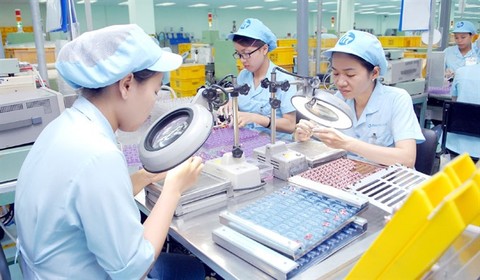New FDI strategy should focus on domestic sector: experts
 |
| Electric motors produced at Mabuchi Motor Viet Nam. It is critical that Viet Nam strengthens FDI linkages with domestic firms and boosts its parts supply industry, experts say. - VNA Photo Danh Lam |
They say that even as the rising FDI influx over the last few decades increases its contribution to the national economy, it has performed below expectations in promoting the domestic economic sector.
Do Nhat Hoang, director of the Viet Nam Foreign Investment Agency under the Ministry of Planning and Investment, noted that FDI could hit a ten-year high of US$35 billion in registered capital this year with disbursement estimated at $17 billion – a record high.
The major role that FDI plays in the Vietnamese economy can be seen in the fact that it accounts for 55 per cent of industrial production,70 per cent of export revenue, 18 per cent of budget collection and 3.7 million direct jobs.
However, the FDI sector’s role in promoting the domestic economic sector has fallen far short of expectations, said Nguyen Mai, Chairman of Viet Nam Association of Foreign Invested Enterprises.
Vietnamese firms still have very modest positions in the global supply chain, he said.
For example, in textiles and garments, domestic firms continued to participate mainly in low-added value stages, despite the sector’s exports reaching $30 billion in 2016, accounting for four per cent of the global turnover.
Mai said a similar story was repeated in mobile phones production.
Nguyen Manh Linh, an official with the Ministry of Industry and Trade, said that very few domestic firms were able to become parts suppliers to FDI enterprises, and they still failed to meet the latter’s strict requirements.
Besides, Linh said, many localities competed with each other in attracting FDI by offering greater incentives, hoping to create jobs and boost local GDP. But they paid little attention to FDI quality and technology transfer, he added.
This situation is a cause for concern, experts say, adding that it has become critical and imperative that Viet Nam comes up with an FDI strategy that directs the inflow into domestic enterprises.
Mai said FDI quality was the most important factor and its impact on the domestic enterprises was an indicator.
Luong Van Khoi, Director of the National Centre for Socioeconomic Information and Forecasting, said it was necessary to impose technology transfer and local procurement requirements on FDI enterprises in Viet Nam.
Experience from other countries show that incentives provided to FDI companies should be halted if they did not promote technology transfer or strengthen linkage with domestic firms, Khoi said.
At the same time, Khoi added, Viet Nam needed an effective strategy for developing its spare parts industry.
FDI enterprises should also have strategies to connect with domestic firms while local firms should actively enhance their competitiveness to meet requirements of FDI companies.
Hence, along with a new five-year (2018-23) FDI attraction in the context of Industry 4.0, Viet Nam should also develop a law on building a strong support industry, the experts said.
What the stars mean:
★ Poor ★ ★ Promising ★★★ Good ★★★★ Very good ★★★★★ Exceptional
Latest News
More News
- 14th National Party Congress: Promoting OV's role in driving sustainable development (January 20, 2026 | 09:31)
- 14th National Party Congress affirms Party’s leadership role, Vietnam’s right to self-determined development (January 20, 2026 | 09:27)
- Direction ahead for low-carbon development finance in Vietnam (January 14, 2026 | 09:58)
- Vietnam opens arms wide to talent with high-tech nous (December 23, 2025 | 09:00)
- Why global standards matter in digital world (December 18, 2025 | 15:42)
- Opportunities reshaped by disciplined capital aspects (December 08, 2025 | 10:05)
- Fresh M&A cycle ahead as reforms begin to take effect (December 08, 2025 | 08:00)
- What foreign investors need to know to unlock new deals (December 08, 2025 | 08:00)
- Telecoms advances expected to penetrate all sectors and fields (December 03, 2025 | 13:00)
- Main drivers for Vietnam’s digital economy future (December 03, 2025 | 11:35)

















 Mobile Version
Mobile Version